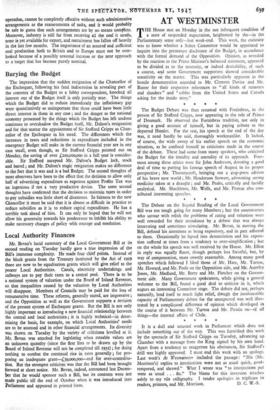AT WESTMINSTER
THE House met on Monday in the not infrequent condition of a state of suspended expectation, heightened by the—in the Parliamentary sense only—lost week-end. This week, the curiosity was to know whether a Select Committee would be appointed to inquire into the premature disclosure of the Budget, in accordance with the formal demand of the Opposition. Opinion, as revealed by the reaction to the Prime Minister's balanced statement, appeared to be divided as to the necessity, or indeed desirability, of such a course, and some Government supporters showed considerable sensitivity on the matter. This was particularly apparent in the hostile demonstration accorded to Mr. Clement Davies and Mr. Baxter for their respective references to "all kinds of rumours and slanders " and " cables from the United States and Canada asking for the inside story."
The Budget Debate was then resumed with Fortinbras, in the person of Sir Stafford Cripps, now appearing in the role of Prince of Denmark. He observed the Fortinbras tradition, not only in giving a good account of himself, but in paying tribute to the departed Hamlet. For the rest, his speech at the end of the day was, it need hardly be said, thoroughly workmanlike. It lacked, of course, the wide sweep of his earlier speech on the economic situation, as he confined himself to criticisms made in the course of the debate. These had come from many speakers, who criticised the Budget for the timidity and unreality of its approach. Fore- most. among these critics were Sir John Anderson, devoting a good deal of time to putting his famous speech of August in its proper perspective ; Mr. Thorneycroft, bringing out a stop-press edition of his brave new world ; Mr. Henderson Stewart, advocating strong medicine taken at a draught ; and Mr. Peak; critically and lucidly analytical. Mr. Shackleton, Mr. Wells, and Mr. Pitman also con- tributed interesting speeches.
* * * * The Debate on the Second Reading of the Local Government Bill was too tough going for many Members ; but the connoisseurs who savour with relish the problems of rating and valuation were well rewarded for their attendance by a debate that was always interesting and sometimes stimulating. Mr. Bevan, in moving the Bill, defined his intentions as being expository, and in part adhered to them. Occasionally he lapsed into denunciation and his exposi- tion suffered at times from a tendency to over-simplification ; but on the whole his speech was well received by the House. Mr. Elliot in reply was equally fluent, though perhaps less forceful, but, by way of compensation, more sweetly reasonable. Among many good speeches which followed I liked those of Mr. Hare, Mr. Turton, Mr. Howard, and Mr. Poole on the Opposition side, and Mr. Asterley Jones, Mr. Medland, Mr. Berry and Mr. Fletcher on the Govern- ment side. Many Government spokesmen, while giving a general welcome to the Bill, found a good deal to criticise in it, which augurs an interesting Committee stage. The debate did not, perhaps naturally, lend itself to much light relief, though the inexhaustible capacity of Parliamentary debate for the unexpected was well illus- trated by a complicated difference of opinion which developed in the course of it between Mr. Turton and Mr. Piratin on—of all things—the internal affairs of Chile.
* * *
It is a dull and unusual week in Parliament which does not include something out of the way. This was furnished this week by the spectacle of Sir Stafford Cripps on Tuesday, advancing up Chamber with a message from the King signed by his own hand. Apart from a tendency to exaggerate his obeisances, Sir Stafford's drill was highly approved. I must end this week with an apology. Last week's At Westminster included the passage : " His (Mr. Morrison's) replies to interjections were not as usual quick, good- tempered, and shrewd." What I wrote was " to interjections put were as usual . . . &c." The blame for this inversion attaches solely to my vile calligraphy. I tender apologies in triplicate to
readers, printers, and Mr. Morrison. D. C. W.-S.


































 Previous page
Previous page